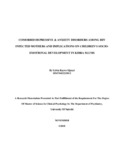| dc.contributor.author | Sijenyi, Sylvia R | |
| dc.date.accessioned | 2019-01-15T11:58:53Z | |
| dc.date.available | 2019-01-15T11:58:53Z | |
| dc.date.issued | 2018 | |
| dc.identifier.uri | http://hdl.handle.net/11295/104756 | |
| dc.description.abstract | Introduction: Mental health and HIV/AIDS have been closely interlinked; this is with regards to the attribution of mental disorders to the increase in the prevalence of HIV infections and HIV infections being associated with the increase in the prevalence of mental disorders. Some of the neurological or mental disorders that are commonly linked to HIV/AIDS globally are depression and anxiety and their comorbidity. This comorbidity which is more prevalent among women can consequently impact the relationship between a mother and her child especially with regards to the social-emotional development of the child which is linked to general well being and adaptive adjustment in adulthood. Unfortunately, studies looking into the impact of this comorbidity, particularly, in HIV- infected mothers, on children’s socio-emotional development is scarce. Study objective: Hence this study aims to assess the prevalence of co- morbid depression and anxiety disorder in HIV- positive mothers and its implication on child’s socio-emotional development
Research Design: The study adopted a descriptive cross-sectional research design
Study Site: The research was carried out at the Kibra South clinic.
Target Population: The study targeted HIV positive mothers with children between the age of 24 and 36 months.
Sample size: Systematic random sampling was used to get 185 respondents.
Research Instruments: A researcher- designed questionnaire was used to determine the respondents’ socio-demographic factors; short version BDI and BAI was used to determine the prevalence of depression and comorbid anxiety and Brief Infant and Toddler Social Emotional Assessment for 0 and 36months was used to identify children with emotional and social difficulties.
ix
Data Analysis: Data analysis was done using SPSS version 23 and presentation of data was done by use of frequency tables, bar charts and pie charts. Association between variables was represented through Chi square. Cramer’s phi Coefficient (Cramer’s V) and Pearson’s Correlation (Pearson’s r) statistics were used to show correlations between variables.
Results: The prevalence of Comorbid depression and anxiety among the HIV -positive mothers attending the Kibra South Clinic was 38.4%. The prevalence of socio-emotional development problems among children was also 38.9%. There was no association between comorbid depression and anxiety in HIV infected mothers and child’s emotional development problems at a P=0.672. However, there was a negative linear relationship between the competence deficit component of socio-emotional development and BDI scores (depression) { r = -.154, p =. 0.037}. Meaning that as severity of depression increased, the child was more likely to have competence delays or deficits.
Conclusion: Prevalence of Comorbid depression and anxiety among the HIV -positive mothers attending the Kibra South Clinic was high. Prevalence of socio- emotional development problems in the toddlers was also significantly high. | en_US |
| dc.language.iso | en | en_US |
| dc.publisher | University of Nairobi | en_US |
| dc.rights | Attribution-NonCommercial-NoDerivs 3.0 United States | * |
| dc.rights.uri | http://creativecommons.org/licenses/by-nc-nd/3.0/us/ | * |
| dc.subject | Disorders Among Hiv Infected Mothers | en_US |
| dc.title | Comorbid Depressive & Anxiety Disorders Among Hiv Infected Mothers And Implications On Children’S Socio-Emotional Development In Kibra Slums | en_US |
| dc.type | Thesis | en_US |
| dc.description.department | a
Department of Psychiatry, University of Nairobi, ; bDepartment of Mental Health, School of Medicine,
Moi University, Eldoret, Kenya | |



